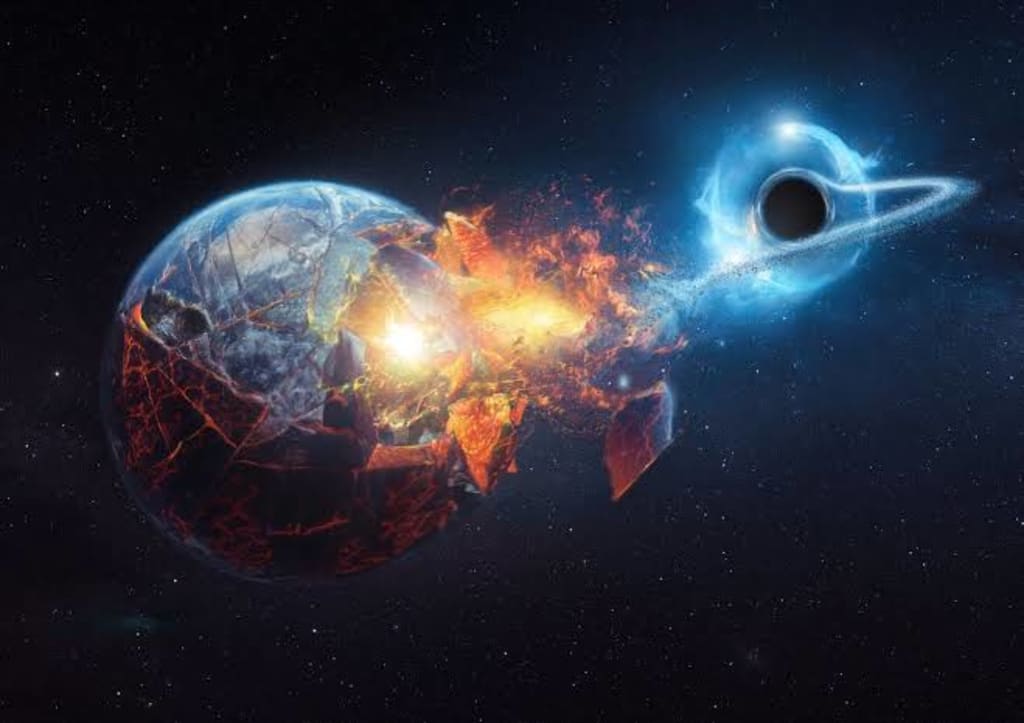What If Earth Were Sucked Into a Black Hole?
Into the Abyss: Earth's Hypothetical Plunge into a Black Hole

In the cosmos that stretches beyond our understanding, a question looms like a specter of uncertainty: Could the relentless pull of a black hole one day swallow the Earth and all that it encompasses? With countless black holes lurking in the universe's expanse, this query resonates with intrigue and trepidation. And, in the event of an accidental creation of a black hole, the impending outcome would be far from mundane. Brace yourself for a journey into the abyss where the very fabric of reality unravels, and the Earth finds itself caught in a gravitational maelstrom. This is a tale of "what if," a contemplation of the enigma that is a black hole, and the haunting implications of Earth's hypothetical descent into its grasp.
Just a mere 3,000 light-years from our fragile blue planet resides a black hole—intangible yet potent. We count our blessings, for we are a safe distance from this cosmic marvel. However, in the vast expanse of our galaxy alone, an estimated 100 million black holes exist, each a remnant of the explosive supernovae that mark the culmination of massive stars' existence. Among these are stellar black holes, with diameters of approximately 16 kilometers, and then there are the celestial giants—supermassive black holes—whose dimensions rival our entire solar system, with masses exceeding a million suns united.
But what danger does a black hole pose to us? Can an infinitesimal pinprick's worth of a black hole spell our demise? In the intricate dance of gravitational forces, proximity is key. A black hole, minuscule in size, yet staggeringly dense, could unleash unparalleled destruction if positioned within close quarters of Earth. Our survival, however, hinges on a pivotal boundary: the event horizon—the point of no return for all that ventures too close. A cosmic Rubicon beyond which even light falters.
Imagine the nightmare: Earth gravitating perilously close to the abyss. Inexorably, the side facing the black hole stretches and contorts, while our atmosphere dissipates in a vacuum. Masses of our beloved planet splinter and fragment, their destiny tied to an irresistible gravitational force. Should Earth orbit within the black hole's pull, tidal forces transform our home into a crucible of chaos. The planet's very core heats to cataclysmic levels, triggering cataclysmic earthquakes, volcanoes, and monstrous tsunamis—a symphony of destruction that heralds our doom.
Enter the ominous term: "spaghettification." A fate as grim as its name implies. In the gravitational throes of a black hole, the fabric of our being stretches and twists in grotesque contortions. The hypothetical superhero who dares to battle the maw of a black hole headfirst would find limbs elongating while the body compresses. In the case of smaller stellar black holes, the spectacle of spaghettification unfurls several hundred kilometers before the event horizon. For the colossal supermassive counterparts, physicists believe this gruesome distortion commences within the very heart of the event horizon itself. Regardless of size, any entity ensnared is subjected to a merciless unraveling—atoms to atoms, particles to particles. A cosmic deconstruction that knows no exceptions.
The fate of our solar system, a celestial ballet perfected over eons, is sealed. The sun, a nurturing life-giver, transforms into a malevolent force, becoming a partner in Earth's death dance. As gravity's grasp tightens, the delicate equilibrium of orbits shatters. Planets veer toward collision, the orchestration of cosmic bodies collapsing into disarray. Earth, flung into chaos, confronts the looming prospect of an asteroid onslaught. Hundreds of these colossal space rocks hurtle toward us, destined to strike with devastating impact.
Radiation—an inevitable byproduct of matter succumbing to the black hole's grasp—radiates with furious intensity. In this turbulent universe, even if the onslaught of asteroids is thwarted, we are ultimately ensnared by the unyielding grip of radiation. Death, by that invisible hand, seems inescapable.
Intriguingly, our understanding of physics itself becomes an enigma within the unfathomable depths of a black hole. The boundaries of gravity, the very speed of light, the fundamental interactions of atoms—all crumble under the weight of such a cosmic chasm. Once past the event horizon, the script of reality rewrites itself in a cosmic mystery. Could we find ourselves ensconced in another dimension, entangled within a parallel universe, or perhaps destined to remain trapped, prisoners within the infinite cycle of a black hole's singularity? The answers are elusive, locked within the abyss, beyond the reach of human comprehension.
In the grand tapestry of existence, the question of Earth's fate in the clutches of a black hole remains, for now, a speculative hypothesis. Yet, it beckons us to contemplate our cosmic insignificance and the mysteries that linger beyond our understanding. As we peer into the abyss of the unknown, the tale of Earth's encounter with a black hole is relegated to the realm of imagination—a story forever inscribed in the annals of "what if."
Watch the video on YouTube @whatif






Comments
There are no comments for this story
Be the first to respond and start the conversation.